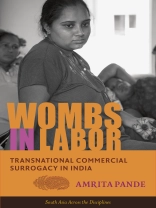Surrogacy is India’s new form of outsourcing, as couples from all over the world hire Indian women to bear their children for a fraction of the cost of surrogacy elsewhere with little to no government oversight or regulation. In the first detailed ethnography of India’s surrogacy industry, Amrita Pande visits clinics and hostels and speaks with surrogates and their families, clients, doctors, brokers, and hostel matrons in order to shed light on this burgeoning business and the experiences of the laborers within it. From recruitment to training to delivery, Pande’s research focuses on how reproduction meets production in surrogacy and how this reflects characteristics of India’s larger labor system.
Pande’s interviews prove surrogates are more than victims of disciplinary power, and she examines the strategies they deploy to retain control over their bodies and reproductive futures. While some women are coerced into the business by their families, others negotiate with clients and their clinics to gain access to technologies and networks otherwise closed to them. As surrogates, the women Pande meets get to know and make the most of advanced medical discoveries. They traverse borders and straddle relationships that test the boundaries of race, class, religion, and nationality. Those who focus on the inherent inequalities of India’s surrogacy industry believe the practice should be either banned or strictly regulated. Pande instead advocates for a better understanding of this complex labor market, envisioning an international model of fair-trade surrogacy founded on openness and transparency in all business, medical, and emotional exchanges.
Table des matières
Acknowledgments
1. Introduction: Wombs in Labor
2. Pro-natal Technologies in an Anti-natal State
3. When the Fish Talk About the Water
4. Manufacturing the Perfect Mother-Worker
5. Everyday Divinities and God’s Labor
6. Embodied Labor and Neo-eugenics
7. Disposable Workers and Dirty Labor
8. Disposable Mothers and Kin Labor
9. Conclusion: Aporia of Surrogacy
Epilogue: Did the ‘Sperm on a Rickshaw’ Save the Third World?
Appendix A. Selected Clauses from the Assisted Reproductive Technologies (Regulation) Draft Bill
Appendix B. Consent Form to Be Signed by Surrogates
Appendix C. Descriptive Tables
Notes
Works Cited
Index
A propos de l’auteur
Amrita Pande is a senior lecturer in sociology at the University of Cape Town. Her research focuses on the intersection of new technologies and reproductive labor, and her writings have appeared in
Signs: Journal of Women in Culture and Society,
Gender and Society,
Critical Social Policy,
International Migration Review,
Qualitative Sociology,
Feminist Studies, the
Indian Journal of Gender Studies,
Reproductive Bio Medicine, and in several edited volumes. She is also an educator-performer and is currently involved in a multimedia theater performance,
Made in India: Notes from a Baby Farm, which is based on her ethnographic work on surrogacy.












